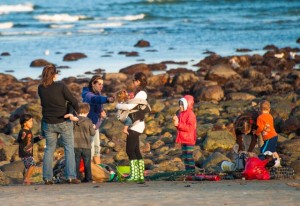
Climate change is a security risk, indeed the largest Asia Pacific security risk: So warned Admiral Samuel J. Locklear III, Commander, US Pacific Command, The Boston Globe reported on March 9.
Locklear is one of six US four-star admirals, the highest rank now serving in the Navy. In December he described his area of command to the Asia Society:
The Asia-Pacific has been described as stretching from “Hollywood to Bollywood” and that’s really the area of my focus, from California to India. It encompasses over half the earth’s surface and well more than half of its population… the Pacific Ocean itself is the largest physical feature on the planet. If all the world’s landmasses were placed in the Pacific, there would still be room left over for an additional Africa, Canada, United States, and Mexico. [Ellipsis in original.]
According to Bryan Bender (‘Chief of US Pacific forces calls climate biggest worry’, Boston Globe, Mar. 9, 2012, p. A7), Adm. Locklear
…said significant upheaval related to the warming planet “is probably the most likely thing that is going to happen … that will cripple the security environment, probably more likely than the other scenarios we all often talk about.’’
His charge includes North Korea and China.
“People are surprised sometimes,” he added, describing the reaction to his assessment. “You have the real potential here in the not-too-distant future of nations displaced by rising sea level. Certainly weather patterns are more severe than they have been in the past. We are on super typhoon 27 or 28 this year in the Western Pacific. The average is about 17.”
The imminent consequences of rising seas are clear to Adm. Locklear:
“The ice is melting and sea is getting higher,” Locklear said, noting that 80 percent of the world’s population lives within 200 miles of the coast. “I’m into the consequence management side of it. I’m not a scientist, but the island of Tarawa in Kiribati, they’re contemplating moving their entire population to another country because [it] is not going to exist anymore.”
The US military, he said, is beginning to reach out to other armed forces in the region about the issue.
“We have interjected into our multilateral dialogue – even with China and India – the imperative to kind of get military capabilities aligned [for] when the effects of climate change start to impact these massive populations,” he said. “If it goes bad, you could have hundreds of thousands or millions of people displaced and then security will start to crumble pretty quickly.’’
That last paragraph bears rereading a couple of times. Adm. Locklear has the responsibility to look beyond coastal erosion and the losses of homeowners and coastal businesses to storm surges.
Last week’s storm cost – at least temporarily — a dozen or so families their homes on Plum Island, near Newburyport, Mass. Their displacement will cause little disruption to civil society.
But ‘hundreds of thousands or millions of people’: ‘then security will start to crumble pretty quickly.’
***
Over the weekend, I thought much about what Adm. Locklear said and the clarity with which he said it.
He brought to mind an assertion by Samuel Eliot Morison, an influential Harvard historian of the mid-20th century and a US Navy rear admiral. In his best selling Oxford History of the American People (New York: Oxford Univ. Press, 1965), he argued Queen Elizabeth I had shown great wisdom to avoid sending armies into Europe, but instead had focused on lands beyond the seas. For Morison, the implications of military (land) and naval power were clear:
But sea power has never led to despotism. The nations that have enjoyed sea power even for a brief period – Athens, Scandinavia, the Netherlands, England, the United States – are those that have preserved freedom for themselves and have given it to others. Of the despotism to which unrestrained military power leads we have plenty of examples from Alexander to Mao. [p. 46]
As the tattered military (ground and air) continue the war on terror whilst Homeland Security walls up fortress America, Adm. Locklear, I think, suggests the most likely threat to global security: global warming.
Can the notion of freedom represented in nations ‘from Hollywood to Bollywood’ survive rising seas and ever-increasing displacements?
We’re in the process of finding out and doing almost nothing to shape the outcome positively.
Recent Comments